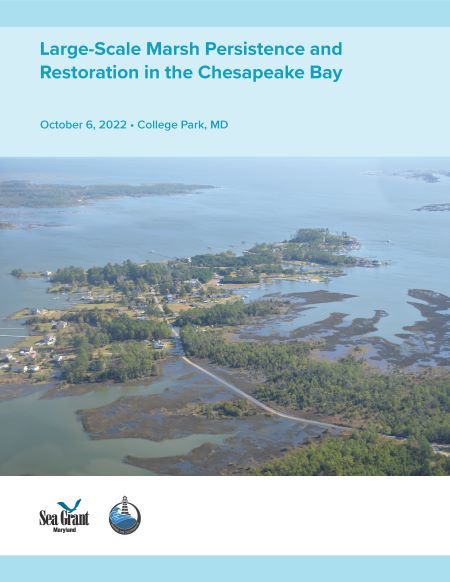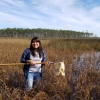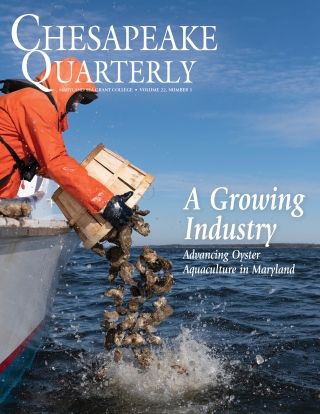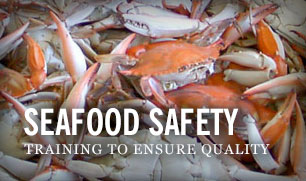Knauss legislative fellowships in Congress help build careers — and they're fun and educational. See our video and fact sheet for details.
Large-Scale Marsh Persistence and Restoration in the Chesapeake Bay
 Sponsored by Maryland Sea Grant.
Sponsored by Maryland Sea Grant.
Date: October 6th, 2o22
Location: University of Maryland Golf Course Clubhouse, 3800 Golf Course Rd, College Park, MD 20742
Workshop participants were invited from a variety of communities including coastal resilience scientists, managers, planners, and funders.
Brief Summary of the Workshop
On October 6, 2022, Maryland Sea Grant and the Chesapeake Bay Sentinel Site Cooperative hosted a one-day workshop with marsh resilience and local community experts to discuss ways in which to plan for and collaborate on large-scale* marsh conservation andrestoration projects in the Chesapeake Bay. This workshop was not a conference of presentations, rather a collaborative work session driven by a diverse group of experts and interests. Participants specifically focused on answering:
- What type of tidal marsh projection, acquisition, or restoration will have the greatest impact on the Chesapeake watershed in light of climate change impacts and the need for social equity?
- How can we design and fund projects to yield the maximum amount of ecological and socioeconomic benefits?
- Over the next five years, what is our trajectory to implement these "large-scale" projects?
*Large-scale may mean large, significant areas or a cumulative network of smaller, significant sites
The event was free of charge and was held both online and in-person.
This workshop worked in conjunction with other Chesapeake Bay and Mid-Atlantic efforts to improve wetland resilience. We referred to the progress and lessons learned from:
- EPA RESILIENT Coastal Wetlands, Coastal Communities Multi-Regional Workshop May 24-25,2022
- Chesapeake Bay Program Wetlands Outcome Attainability Workshop
- Chesapeake Bay Sentinel Site Cooperative Marsh Resilience Summit
Workshop Presentations and Materials
All participants were provided with a briefing book of materials.
Additional information generated from the workshop will be posted soon.
Plenary Presentations
State of tidal wetlands in the Chesapeake Bay: Grand challenges and big aspirations
Pamela Mason, Senior Research Scientist, Center for Coastal Resource
Management, Virginia Institute of Marine Science
Large-scale marsh restoration programs-In progress?
Kyle Graham, Senior Program Manager, Ecosystem Investment Partners
Opportunities for landscape-scale conservation impact: Connecting the dots
Holly Bamford, Chief Conservation Officer, National Fish and Wildlife Foundation
Post Workshop Materials
- The Funders Summary (January 2023) describes some of the recurring priorities voiced at a series of workshops in 2021 and 2022, including this workshop. It includes ideas developed in consultation with experts across the region. This summary focuses on the role of wetlands in environmental justice and climate mitigation and adaptation.
- The Preliminary Findings (February 2023) shares summaries of large-scale marsh project ideas generated and refined in this workshop's breakout sessions. Thirteen ideas for large-scale projects were proposed. They describe geographic priority areas, recommended management techniques, potential partner collaborations, funding mechanisms, and ways to engage with surrounding communities and to advance environmental justice. This document also provides the workshop overview in an appendix.
- The Marsh Geomorphology Profiles (December 2023) summarizes the characteristics, capacity for ecosystem services, associated management concerns, and restoration techniques for seven common marsh types in the Chesapeake Bay, based on steering committee guidance and workshop participant discussions. These profiles serve as a summary of the assets and challenges associated with a marsh type across different ecosystem services and recommended management techniques.

The Chesapeake Bay Sentinel Site Collaborative is a group of scientists, coastal managers, decision makers, and community liaisons across Maryland and Virginia focused on applying sea level rise science to stakeholder decision making.
For more information, please contact:

Coordinator for the Chesapeake Bay Sentinel Site Cooperative
Phone: (301) 405-6378
Email: sudol@mdsg.umd.edu







